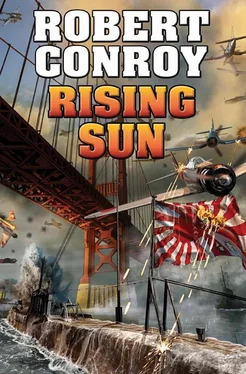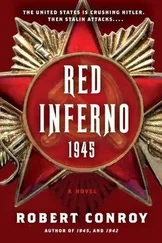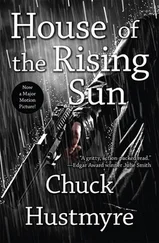“And this went out in plain English?” Hopkins asked, bemused.
“Yes, sir,” Tim responded. “A very simple, innocuous message that no one would give a second thought to.”
“Clever. Admiral, will the Germans in Mexico be picked up?”
Spruance turned to Dane who answered. “Not just yet, sir. We may have to send and receive other messages, and, also, picking them up might alert the enemy. However, the FBI has men down there watching them.”
Dane hoped that the agents in Monterrey would be a little smarter than the local cops who’d let themselves be discovered by Braun and Krause while watching Swenson Engineering.
“Very well,” said Hopkins. “Now we can begin planning at this end.”
* * *
Admiral Yamamoto read the message from the navy’s headquarters in Tokyo with a combination of delight and concern. The Saratoga had been found and she was in bad shape. She needed significant repairs that would take several weeks. What her precise problems were and what caused them were not mentioned, nor were they particularly important. What was important was that she would be in North American waters and the message warned that an attack on her would be dangerous.
He laughed at those concerns. Dangerous? War was dangerous. So too was crossing the street in downtown Tokyo. Doing nothing was even more dangerous and could even prove fatal. Danger was a chance to be taken.
As before, he was on board the Yamato and his guests were Admirals Kurita and Nagumo. Both men had read the reports and both had serious doubts about their validity. Still, they had toasted the good news that the American carrier had been located with some of Yamamoto’s limited supply of good scotch.
“Can we believe this?” the dour and somber Nagumo asked. “How can we risk our carriers on such flimsy information?”
Kurita nodded. “And it may well be a trap to get our carriers close to American planes and guns.”
Yamamoto took a deep breath. Neither of the other admirals had ever been a gambler, yet gambles were sometimes necessary. The Japanese Navy had to do something to break what had become a stalemate in the Pacific. Granted, the Imperial Japanese Navy had been victorious in so many battles, but, as he’d said earlier, the United States was getting stronger and smarter each day. It was not the time for caution. It was the time for aggression, and yes, for taking chances. However, taking chances and being reckless were not the same thing.
Yamamoto smiled. “We will seek out and destroy that carrier and, by doing so, we will send American hopes reeling. And I believe we can do it without risking our fleet.”
“How?” asked Kurita. He commanded the battleships and these were most vulnerable to American land-based planes. They had to get close to shore for their guns to be effective. Nagumo commanded the two carrier divisions.
“It is quite simple,” Yamamoto answered. “We will attack the Americans quickly and suddenly, and with overwhelming strength. We will conserve the fleet by risking it. Nor will we take half measures. It will be an all or nothing toss of the dice, just as we did at Pearl Harbor.”
Nagumo persisted. “And if it turns out that the Americans are too formidable?”
Yamamoto smiled and took a healthy swallow of his scotch. He openly hoped that the war would end soon so he could get some more. Perhaps he could arrange for a few cases to be sent to him as war reparations from the British.
“The Americans are in disarray,” he said. “They are trying to defend far too much. While I mourn for the men lost in Alaska, their defeat was ordained and has nothing to do with what we shall accomplish in the Gulf of California. The army made a terrible mistake in landing at Anchorage. We, the navy, will make no such mistakes.”
Nagumo shook his head. “I urge caution. Your plan is good, but I disagree as to the possible price. It may well be unacceptably high. One carrier for one of theirs is a fair price; even two of ours for their last one would be acceptable. But what if the price was higher? What if we lost three? And don’t forget that they don’t have to be sunk to be out of the war.”
Yamamoto squirmed inwardly. Outwardly he was his normal, composed self. “We will continue to plan for the attack. We will also, however, confirm what we have been told and attempt to evaluate the risks involved. But mark my words, I want that carrier destroyed.”
* * *
Lieutenant General John DeWitt was again trying to control his anger. Once again, he thought, this son of a bitch Hopkins was trying to tell him how to run his army, his command, and all the way from Washington, no less. Worse, he had to take it. Admirals Spruance and Nimitz were obviously trying not to laugh at his discomfiture, but he wondered how loudly they’d guffaw once they were alone. He was being mocked and there wasn’t anything he could do about it.
The navy was trying to take over the army, and that was intolerable. There was a war on and DeWitt had been tasked to protect the people of the West Coast from invasion, while the navy’s assignment had been to keep the Jap fleet from our shores. In DeWitt’s opinion, the navy had failed miserably while the army had succeeded in defeating the Japs in Alaska, so why was there this rush to give the sailors even more authority?
Nimitz tried to be conciliatory. “General, I know how much you must dislike this arrangement, but I assure you it is only temporary.”
“You have no idea what I am thinking, Admiral,” DeWitt snapped with more anger than he’d intended.
“Enough,” said Hopkins. “The situation requires one commander, at least for the time being, and that one commander is going to be Admiral Nimitz. Quite seriously, General, if the command structure is that distasteful, then a replacement for you can be found.”
Bluff called, DeWitt thought, and pulled back. “Of course I will comply and obey, Mr. Hopkins, but I do wonder at the necessity of it all.”
Hopkins sighed. “It’s because the president has signed off on a risky and daring venture that requires all people to be not only on the same page, but reading the same word and understanding the same meaning. We may have an opportunity to cause great harm to the Japanese and it is essential that army and navy efforts be coordinated to the utmost. There can be no mistakes, no confusion as to who is in charge, and no missed or misunderstood communications.”
DeWitt was somewhat mollified. More than anything, he wanted the Japanese to pay for Pearl Harbor and the Philippines. At least the destruction of the Japanese force that had landed at Anchorage had been not only an army victory, but a nationwide morale booster. Of course, he had to admit that the navy’s smashing of the Japanese reinforcement force had played an important role as well.
Nimitz continued. “Simply put, General, we hope to trap at least a large part of the Japanese fleet near our shores and either defeat or destroy it. We hope we have led the Japanese to believe that the Saratoga will be in the Gulf of California in a while, and we absolutely need the army’s planes to help support the ambush we hope to spring.”
DeWitt still had his doubts. “But what you are asking, moving hundreds of planes from bases in California and elsewhere to spots where they can cover the Baja, will leave much of the West Coast naked and defenseless. Should the Japanese decide to attack other than where you think, it could be catastrophic. Not only that, but we will have to move large numbers of engineers and mechanics to bases that don’t yet exist. And will the Mexicans even cooperate, since we’ll be operating on their land?”
Hopkins sipped his coffee and made a face. It had gotten cold. There were no stewards available to get him a refill. They were all alone in the room. Secrecy had its drawbacks.
Читать дальше












